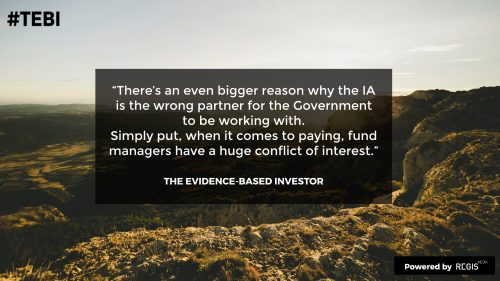By any objective measure, company executives in Britain today are extraordinarily well paid. It would take a typical worker 160 years to earn what the average CEO of a FTSE 100 company is paid in just 12 months.
For those of us who think that such disparity is not particularly healthy for society, the economy or indeed capitalism in general, the Government’s announcement this week of its plans to tackle boardroom excess were a big disappointment.
For example, the Government has backtracked on two key promises — binding shareholder votes on executive pay and forcing companies to have an employee representative on the board.
What added insult to injury for me was the news that the “crackdown” on corporate greed will effectively be a joint initiative between the Department for Business, Energy and Industrial Strategy and — wait for it — the Investment Association.
That’s right, in a separate announcement, the trade body that represents the UK fund industry announced that it would be in charge of overseeing a public register which would name those UK-listed companies that had experienced a 20% or greater opposition from their shareholders to their executive pay packages.
The Investment Association. Are we supposed to laugh or cry?
This, remember, is the same trade body that has spent the last 20 years obstructing efforts to make the cost of asset management fairer and more transparent; that ousted its former chief executive Daniel Godfrey for introducing a statement of principles requiring its members to put clients’ interests ahead of their own; and that, just a few weeks ago, was roundly criticised in a hard-hitting report by the Financial Conduct Authority on competition (or rather the lack of it) in the asset management industry.
But even if the Investment Association were a fit and proper organisation to be put in charge of such an important task (and I would strongly argue that it isn’t), there’s an even bigger reason why the IA is the wrong partner for the Government to be working with. Simply put, when it comes to paying, fund managers have a huge conflict of interest.
In recent years, fund managers have taken over from investment bankers as the highest paid employees in the City — despite the fact, as the FCA report identified, that they generally extract value from the investment process rather than add it. And, because fund management companies are themselves the biggest shareholders of publicly owned companies, there’s a direct connection between what they are paid and what company bosses are paid.
So what, from asset managers’ point of view, if executives are grossly overpaid? It just isn’t in their interest to draw attention to the fact, or to hold companies to account.
As the UK Shareholders’ Association (UKSA) announced on Twitter, giving the IA responsibility for running the register is like “appointing foxes to keep a register of poor chicken coop builders”.
Relations between HM Government and the fund industry have been far too cosy for years. There are too many senior politicians on the boards of asset managers, and it’s too easy for ex-ministers like George Osborne to walk straight into hugely well paid jobs in the City.
But in asking the Investment Association to police corporate pay, the Government really has gone too far.








